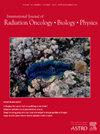Radiation-Induced Nephrotoxicity: Role of Sphingomyelin Phosphodiesterase Acid-like 3b
IF 6.4
1区 医学
Q1 ONCOLOGY
International Journal of Radiation Oncology Biology Physics
Pub Date : 2024-12-10
DOI:10.1016/j.ijrobp.2024.11.105
引用次数: 0
Abstract
Purpose
Radiation nephropathy (RN) can be a significant late complication after radiation therapy (RT) for abdominal and paraspinal tumors. The mechanisms for the development of RN are thought to involve disruption of podocyte function, leading to podocyte cell death and, finally, impaired renal function. This study investigated the mechanistic role of sphingomyelin phosphodiesterase acid-like 3b (SMPDL3b) in regulating podocyte injury and renal function after irradiation. The aim of the study was to investigate the potential linkage between (1) RT-induced renal dysfunction and podocyte SMPDL3b expression and (2) RT-induced podocyte injury and expansion of the glomerular basement membrane (GBM).
Methods and Materials
SMPDL3b wild-type, siSMPDL3b, and SMPDL3b-overexpressing podocytes were irradiated in cell culture, and cell death was assessed. SMPDL3b wild-type and podocyte-specific SMPDL3b knockout mice were treated with focal bilateral kidney X-irradiation (14 Gy, or 6 × 5 Gy), and podocyte apoptosis, renal function parameters, glomerular filtration rate, glomerular histology, and GBM ultrastructural changes via transmission electron microscopy were assessed.
Results
Following RT treatment, a notable decrease in SMPDL3b expression was observed, accompanied by heightened levels of DNA damage, cytoskeletal alterations, and apoptotic events in cultured podocytes. SMPDL3b overexpression notably prevented DNA damage and apoptosis in cultured podocytes. Additionally, in vivo, RT exposure led to a significant decline in SMPDL3b expression, podocyte count, and renal function while concomitantly elevating GBM thickness, mesangial expansion, and renal fibrosis at the 20-week post-RT. Furthermore, in vivo, rituximab pretreatment before RT prevented SMPDL3b downregulation, podocyte loss, mesangial expansion, GBM expansion, and renal fibrosis and ultimately enhanced renal function post-RT.
Conclusions
Our findings collectively suggest a novel function for SMPDL3b in orchestrating the DNA damage response triggered by radiation. This study proposes that SMPDL3b exerts a regulatory influence on the repair of double-strand breaks within podocytes, consequently averting podocyte loss, GBM expansion, and the onset of RN.
辐射诱导的肾毒性:SMPDL3b的作用
背景:放射性肾病(RN)可能是腹部和脊柱旁肿瘤放疗后的一个重要晚期并发症。RN 的发病机制被认为涉及荚膜细胞功能的破坏,导致荚膜细胞死亡,最终损害肾功能。本研究探讨了 SMPDL3b 在调节荚膜细胞损伤和照射后肾功能中的机制作用。研究的目的是探讨(1)RT 诱导的肾功能障碍与荚膜 SMPDL3b 表达之间的潜在联系;(2)RT 诱导的荚膜损伤与肾小球基底膜(GBM)扩张之间的潜在联系:方法:在细胞培养中辐照 SMPDL3b WT、siSMPDL3b 和 SMPDL3b 表达过高的荚膜细胞,并评估细胞死亡情况。对 SMPDL3b WT 和荚膜特异性 SMPDL3b KO(pSMPDL3b KO)小鼠进行局灶性双侧肾脏 X 射线照射(14 Gy 或 6 × 5Gy),并通过透射电子显微镜评估荚膜细胞凋亡、肾功能参数、肾小球滤过率(GFR)、肾小球组织学和 GBM 超微结构变化:结果:经 RT 处理后,在培养的荚膜细胞中观察到 SMPDL3b 表达明显下降,同时 DNA 损伤、细胞骨架改变和凋亡事件的水平升高。SMPDL3b 的过表达可明显防止培养荚膜细胞的 DNA 损伤和凋亡。此外,在体内,RT暴露导致SMPDL3b表达、荚膜细胞数量和肾功能显著下降,同时在RT后20周,肾小球基底膜(GBM)厚度、系膜扩张和肾脏纤维化也同时升高。此外,在体内,RT前的利妥昔单抗预处理可防止SMPDL3b下调、荚膜细胞丢失、系膜扩张、GBM扩张和肾脏纤维化,并最终增强RT后的肾功能:我们的研究结果共同表明,SMPDL3b 在协调辐射引发的 DNA 损伤反应方面具有新的功能。本研究认为,SMPDL3b 对荚膜细胞内双链断裂(DSB)的修复具有调节作用,从而避免了荚膜细胞丢失、肾小球基底膜(GBM)扩张和辐射肾病的发生。
本文章由计算机程序翻译,如有差异,请以英文原文为准。
求助全文
约1分钟内获得全文
求助全文
来源期刊
CiteScore
11.00
自引率
7.10%
发文量
2538
审稿时长
6.6 weeks
期刊介绍:
International Journal of Radiation Oncology • Biology • Physics (IJROBP), known in the field as the Red Journal, publishes original laboratory and clinical investigations related to radiation oncology, radiation biology, medical physics, and both education and health policy as it relates to the field.
This journal has a particular interest in original contributions of the following types: prospective clinical trials, outcomes research, and large database interrogation. In addition, it seeks reports of high-impact innovations in single or combined modality treatment, tumor sensitization, normal tissue protection (including both precision avoidance and pharmacologic means), brachytherapy, particle irradiation, and cancer imaging. Technical advances related to dosimetry and conformal radiation treatment planning are of interest, as are basic science studies investigating tumor physiology and the molecular biology underlying cancer and normal tissue radiation response.

 求助内容:
求助内容: 应助结果提醒方式:
应助结果提醒方式:


